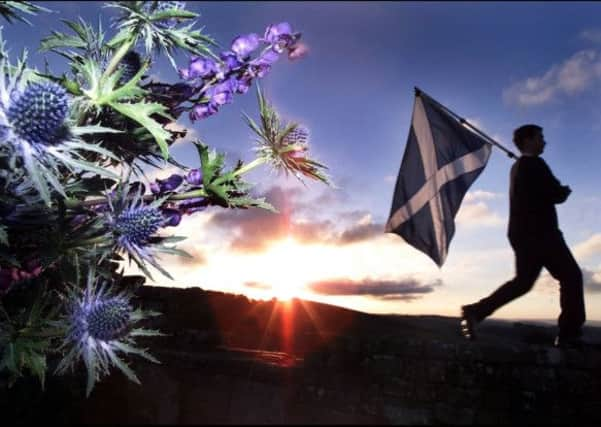Book review: A People’s History of Scotland


A People’s History of Scotland
by Chris Bambery
Verso, 320pp, £12.99
A significant element of the Left will vote Yes in September because it believes that, without the hindrance of English Tory votes, a socialist republic will be established in an independent Scotland.
Chris Bambery’s book supports that view. He is a veteran of virtually every Trotskyist body in the UK, from the International Marxist Group to the Socialist Workers Party and now the small splinter International Socialist Group. The word “international” is something of a puzzle, as the Scottish International Socialist Group is nationalist. The “Scottish Workers’ Republic,” he writes, is “a dream we hold in our hearts and minds.”
Advertisement
Hide AdDo not, then, approach this book expecting to read more of the pussy-footing academic social history which Scotland already has in abundance. Bambery sets out to prove that all of Scotland’s past has led us, with Marxist inevitability, to the day when the red flag will flutter over Holyrood.
A full people’s history must begin with our most distant ancestors. Bambery skips through the post-Ice Age settlers of 11,000 years ago but, the Neolithics not being strong on Gramsci, moves quickly on to the Middle Ages. Although we are promised “a corrective to the usual history of kings and queens, victorious battles and bloody defeats.” When it meets the agenda, as in the Scottish wars of independence, the civil war and the Jacobite risings, this book positively bubbles with kings and queens and gory battles.
Twenty-three pages into his book, Bambery recommends the Holywood movie Braveheart as giving “a good account of [William] Wallace’s life.” That statement should disillusion even the sympathetic reader. The day we defer to Mel Gibson’s version of our past is the day Scottish history dissolves into fantasy.
It is a shame, because there is much of interest here. There is a predictable account of the events leading up to the Treaty of Union in 1707, which was not of course a democratic decision as democracy didn’t exist then. But the plausible analysis that Scottish negotiators – who were representing a bankrupt country – drove a hard bargain through the treaty and that Scotland consequently benefited more from the Union than did England, merits not so much as a nod.
The Enlightenment and the Jacobite risings pose a problem to left-wing nationalists. Bambery flunks the first and passes the second. The Enlightenment flourished in Scotland immediately after the Union. It may have done so anyway – David Hume and Adam Smith would still have been born and educated in an independent Scotland. It is nonetheless difficult to ignore the possibility that the Lowland Enlightenment was kick-started by a fresh and invigorating free association with like minds from the rest of Britain.
No more, if he is writing a people’s history, can a responsible historian avoid the unsavoury connection between the Enlightenment and what Chris Bambery calls “the darkest chapter in Scottish history”, the Highland Clearances. The clearances were a straightforward response from Scottish landowners to Lowland Enlightenment theories of improvement and scorn for tribal responsibilities.
Advertisement
Hide AdThe bulk of this book deals with labour unrest since the 19th century. The growth of trade unionism and the discovery of a political voice in the industrial proletariat is powerful and stirring material. In telling the stories of the ordinary footsoldiers in the Radical War of 1820, of the cotton spinners’ strike of 1837 and of the miners’ struggles from 1840 to 1984, in describing the lives of such as Mary Brooksbank and James Connolly, Bambery offers a Scottish version of EP Thompson’s The Making of the English Working Class.
It is almost a parallel history for, as Bambery says, there was solidarity between workers north and south of the Tweed. The oppressive forces facing cotton weavers in Glasgow were identical to those confronting their equivalents in Lancashire. Coalminers in Fife and Durham had shared conditions, shared aspirations and in some cases the same employers. None of them had much in common with the land wars of the Highland Gaels.
Advertisement
Hide AdBambery argues that the desire for separation was a natural reaction to Thatcherism. This isn’t an original thesis, but it carries some water. Scotland’s Tories might not have disappeared, but most of them no longer vote Conservative.
He acknowledges, however vaguely, that his thesis has a counterpoint. It is that in 1979 Margaret Thatcher became prime minister of a Scotland which had, just 20 years earlier, been a Conservative country.
In three consecutive general elections between 1951 and 1959 most of the north of England and Wales and much of London was vainly attempting to re-elect the Labour government which had. a few years earlier, delivered the welfare state and the NHS.
In the same three elections Scots, in unison with the Home Counties of England, gave more votes to the Tories than to any other party and ensured the premierships of Churchill, Eden and Macmillan – and the continuing presence of Margaret Thatcher as a young MP in the governing party.
Presumably because it throws a nasty curve ball at his theory of Scotland as an intrinsically left-wing society on a millennial march to a workers’ republic, Bambery summarises the Scottish politics of this decade as “incredible”. That is not good enough. Other historians accustomed to exploring and analysing such patterns might wonder, who cannot credit it, and why?
History falls neatly into nobody’s political agenda. Nor, most of the time, does the future.